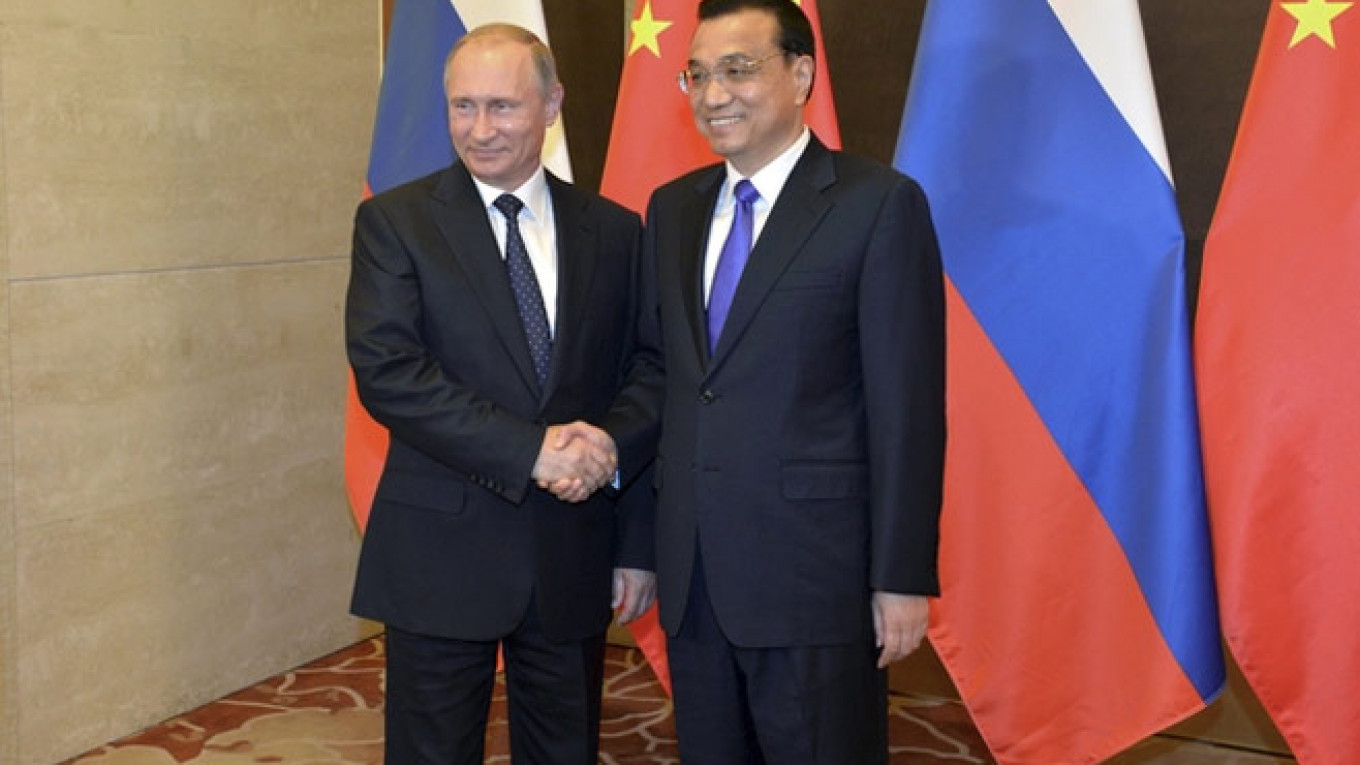Russia's President Vladimir Putin is currently in Beijing to attend a celebration of the 70th anniversary of Allied Powers' victory over Japan in World War II. Putin will try to use his trip to China — the 24th in his long tenure as leader — to enhance economic and political ties between the two countries. This time, however, that seems to be far more problematic than ever before.
First and foremost, Russia may soon feel the effects of China's spectacular economic slowdown. According to official statistics, growth rates decelerated slightly from 7.7 percent in the first quarter of 2013 to 7 percent in the second quarter of 2015 — but calculations based on electricity use suggest the real growth may be as low as 4.5-5 percent.
Combined with a recent stock market crash, this has already caused a downturn in global commodity prices, which has hit Russia hard. Much more important, however, is the fact that China was not only a price-setting player, but by far the biggest importer of raw materials in the world — and Russian authorities looked forward to turning their country into China's largest supplier.
Putin said back in 2007 that by 2025 Russia should dispatch to China around 35 percent of all its oil exports and close to 25 percent of its natural gas supplies (in 2014, the numbers stood at 14.8 and 0.05 percent). Moscow hoped that China would become Russia's new major trading partner, surpassing the EU by 2030.
These days, those dreams have evaporated — no one knows whether the "Power of Siberia" gas pipeline will be completed, and the amount of oil, coal, or non-ferrous ore supplies may also decline since the Chinese will consume raw materials from deposits in Asia, Africa and Latin America. The Chinese helped to develop these deposits in recent years with tens of billions of dollars in overseas investment.
The second big issue is prospective cooperation in Central Asia, considered in Moscow to be strategically important. The Russians believed for years in the possibility of developing the "New Silk Road" connecting China with Europe via continental routes in Siberia, Kazakhstan and Central Russia. But these plans were only plans — the Russians have done nothing to build railway and motorway networks between Russia's southern and western borders.
Vladimir Yakunin, the recently fired chief of Russian Railways, devoted more time to promoting Orthodox religious doctrine and speculating on geopolitical issues than running his company's core business. Therefore the Chinese decided to opt for the southern route, calling it the "Maritime Silk Road" (it has become much more seductive since the completion of the second line of the Suez Canal by the Egyptians), and later turned their attention to Iran — trying to redirect the continental Silk Road to the Caspian Sea's southern shore.
Today, China's foreign direct investments (FDI) in Kazakhstan are 10.5 times greater than those channeled to Russia — and there is little doubt that the "great transit game" Putin relied heavily on has been lost by Moscow. All other pipe dreams, like the one that was connected with the Northern Sea passage, have crumbled as well: In 2014, transit cargo traffic in the Far North went down by 76 percent and is now 4,000 times smaller than what passes through the Suez.
The third crucial topic is problematic cooperation in the defense and military technology spheres. For many years, China had reduced its defense imports from Russia, developing its own industrial capabilities, often by using Russian technologies even without appropriate authorization.
Russia saw China as its closest military ally and hoped to create a solid anti-American grouping. But China's current economic crisis proves that the country is unable to switch from its export-oriented model of development to another one, concentrated on the domestic market. Therefore it seems clear that China will avoid possible showdowns with the West and will try to foster economic cooperation across the Pacific instead.
Therefore the hopes of the Russian leadership that the Chinese may support them in their irresponsible foreign policy moves, look less and less realistic and therefore the main rationale behind Russia's "pivot to the East" is now missing.
The current stance of Russia-China economic and political relations is also far from perfect. The task to push the volume of bilateral trade to $100 billion, which was announced back in 2011, looks totally unrealistic: turnover peaked at $88.8 billion in 2013, decreased slightly to $88.3 billion in 2014, and fell to $30.6 billion in the first half of 2015, which shows a 28.7 percent decline.
Russian hopes for the windfall of Chinese investment that Putin was counting on after the introduction of the Western financial sanctions against Russia in July 2014 have also been dashed — the Chinese put a mere $1.6 billion into the Russian economy in 2014, while the official numbers for capital flight from Russia stood at $151.5 billion for that year.
Of course, these days in Beijing both Putin and Chinese leader Xi Jinping will deliver a lot of speeches and promise "an ever-deepening cooperation," but what remains clear is that the Russia-China "axis" is losing its economic basis very fast. Of course, Putin will not admit anytime soon that his bets on Russia's "Eastern pivot" in general and on deepened Russia-China cooperation in particular were misleading and fruitless.
But as the economic crises in both China and Russia unfold, this policy will become more and more disputed inside the Russian political and economic elite. No one knows how Putin will react, but he has no other major power to seek closer ties with: In the early 2000s he was America's best friend, later he build a "special relationship" with France and Germany, then he turned to China and broke ties with the West.
Where can he turn next? This is Russian foreign policy's biggest mystery, the one that will be crucial after pipe dreams about a possible great Russian-Chinese alliance finally fizzle out.
Vladislav Inozemtsev is a Berthold-Beitz fellow with the DGAP in Berlin and non-resident senior associate with the Center for Strategic and International Studies in Washington, D.C.
A Message from The Moscow Times:
Dear readers,
We are facing unprecedented challenges. Russia's Prosecutor General's Office has designated The Moscow Times as an "undesirable" organization, criminalizing our work and putting our staff at risk of prosecution. This follows our earlier unjust labeling as a "foreign agent."
These actions are direct attempts to silence independent journalism in Russia. The authorities claim our work "discredits the decisions of the Russian leadership." We see things differently: we strive to provide accurate, unbiased reporting on Russia.
We, the journalists of The Moscow Times, refuse to be silenced. But to continue our work, we need your help.
Your support, no matter how small, makes a world of difference. If you can, please support us monthly starting from just $2. It's quick to set up, and every contribution makes a significant impact.
By supporting The Moscow Times, you're defending open, independent journalism in the face of repression. Thank you for standing with us.
Remind me later.








